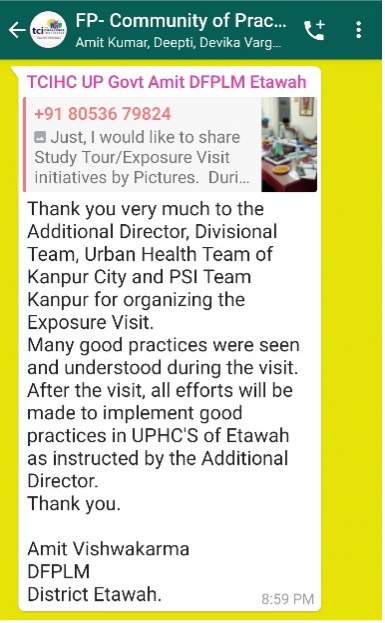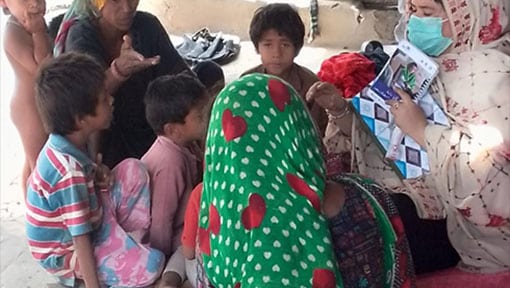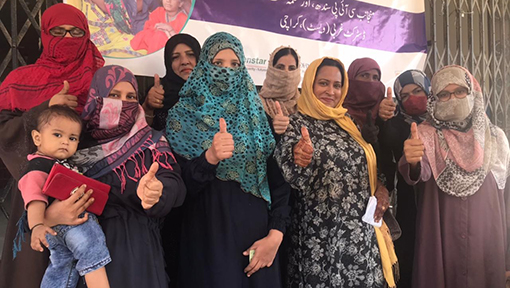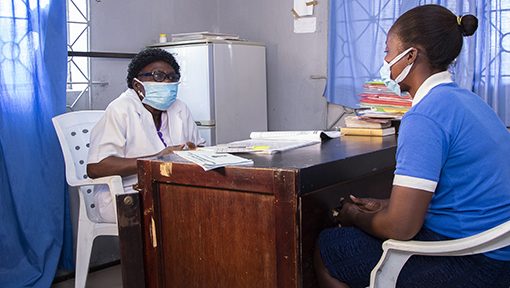TCIHC Hosts Mini University and Study Tour for New Cities in Uttar Pradesh
Contributor: Deepti Mathur & Parul Saxena

The Etawah and Farrukhabad teams on their study tour to Kanpur.
The Challenge Initiative for Healthy Cities’ (TCIHC) approach is locally owned, adaptable, results-driven and embeds coaching within the existing government health system in India to build the confidence of government counterparts to drive sustainable scale-up of family planning and adolescent and youth sexual and reproductive health (AYSRH) interventions.
TCIHC’s model triggered demand from the National Health Mission to expand into additional cities in Uttar Pradesh. In response, TCIHC hosted its first virtual Mini University (Mini U) to introduce its high-impact approaches (HIAs) to new city officials from Farrukhabad, Bulandshahr, Etawah, Rampur and Mau by sharing first-hand experience and lessons learned from their implementation in the high-performing cities of Firozabad, Mathura, Jhansi, Agra and Saharanpur. The objective of the Mini U was to share the transformative effect of the HIAs through experienced cities. In attendance were over 48 participants from new and old cities.
Across the five experienced cities, it was often repeated how coaching to strengthen leadership capacity along with the technical capacity to plan, implement and manage the HIAs was imperative in increasing access to quality family planning services. As a result, the experienced cities coached new cities by sharing personal experiences of implementing the proven solutions. Champions from Agra and Mathura captivated participants by sharing experiences of using TCI University (TCI-U) to access uniform guidance, resources and guidelines in the India toolkit and learn from other cities’ experiences in the form of the most significant change stories. District Urban Health Coordinator of Mathura shared:
TCI-U provides resources and high-impact tools which guide cities on implementing successful family planning and AYSRH interventions. These evidence-based tools are comprehensive and simple. I have earned numerous assessment certificates from TCI-U. In addition, the Family Planning Community of Practice (FP-CoP) group created by TCIHC fosters a learning and sharing environment between cities where new cities could also join and learn from each other’s experience.”
The District Urban Health Coordinator of Firozabad shared:
When we chose to partner with TCIHC, we received a package of high-impact tools. We executed FDS in ready-to-start facilities with high-performing ASHAs. The results were promising; thus, we introduced FDS in all UPHCs.”
Akash Gutam, District Urban Health Coordinator of Mathura coached all of the Mini U participants on crucial steps for strengthening urban ASHAs to reap benefits from this proven approach and critical cadre of frontline health workers. He shared:
Demand generation is the biggest challenge in an urban family planning program. TCIHC through on-site coaching and mentoring support coached urban ASHAs, MoICs and ANMs in reviewing and monitoring ASHAs’ performance. The high-impact tool, ‘Strengthening Urban ASHA’ has enhanced urban ASHAs’ skills, improved reporting and record maintenance not only for family planning but for other health programs as well.”
On the mapping and listing HIA, District Urban Health Coordinator of Firozabad explained the significance of this tool:
The biggest difficulty was to assess the accurate urban population and area. This tool helped to identify unregistered slums and populations. Based on the new demarcated area, we developed plans, reallocated ASHAs, assessed training needs and estimated funds required for additional ASHAs, infrastructure and resources. This approach is very effective to uncover unserved areas and ensures service provision to the most vulnerable and left out pockets of the population.”
Divisional Urban Health Consultant of Saharanpur shared why the partnership with TCIHC has been a blessing to Saharanpur, especially with the introduction of the data for decision-making HIA:
I consider TCIHC partnership a gift because before their technical support we were working without direction. TCIHC brought our focus towards urban family planning. Previously, reviews were limited to permanent methods. But with the technical support of TCIHC, we have initiated data review of all FP methods.”
He went on to share how the introduction of the convergence HIA has similarly helped his city:
Besides, Saharanpur CCC [city coordination committee] was formed in June 2018 with the technical support of TCIHC. Convergence tool has played a significant role in improving urban family planning program and apparently benefitted other health programs as well.”
Dr. Narendra Kumar Jain, Additional Chief Medical Officer of Jhansi, encouraged new cities:
TCIHC has unique tools, techniques and skill sets. New TCIHC-supported cities should utilize their technical expertise and also take self-ownership of their urban family planning programs. For sustenance of the high-impact approaches, interest and ownership at every level counts – from officials at the National Urban Health Mission to the ASHA level. I assure you leveraging opportunities and collaborative efforts will make drastic improvements in family planning achievements of not only urban areas but of the entire district.”
A participant from Farrukhabad, a new TCIHC city, shared what he felt after attending them Mini U and hearing from his colleagues from other cities:
Thanks to TCIHC for organizing this orientation session for us. This helped us to understand the HIAs being used by different cities of Uttar Pradesh. The sharing by different officials has motivated us and will guide us to achieve better results in our district as well.”
Mohammad Anadil, District Urban Health Coordinator from Rampur, shared similar sentiments, noting specifically what its district needed most:
After attending the Mini U, we feel that to strengthen the family planning program, urban ASHAs of Rampur district need to be capacitated on family planning and doing that will benefit us.”
The Mini U virtual session was followed by a learning and exposure study tour. The Etawah and Farrukhabad teams first visited Kanpur to receive in-person coaching from Kanpur city officials.
The Kanpur city team coached the visiting teams and shared its experience and knowledge on conducting a gap analysis, implementing the HIAs, the relevance of convergence platforms, empowering UPHCs to significantly contribute to the urban family planning program, and the importance of data review and monitoring of urban indicators by first strengthening the capacity of ASHAs to prioritize family planning clients and non-users through use of 2BY2 matrix tool.

Screenshot from community of practice on WhatsApp.
Both the Etawah and Farrukhabad teams found the knowledge exchange visit beneficial as reflected by the Divisional FPLMIS manager of Etawah sharing his gratitude to the Kanpur city team over the family planning community of practice on WhatsApp (see image, right). Through the Mini U, new cities in Uttar Pradesh are all set to replicate TCIHC’s HIAs and successes.






